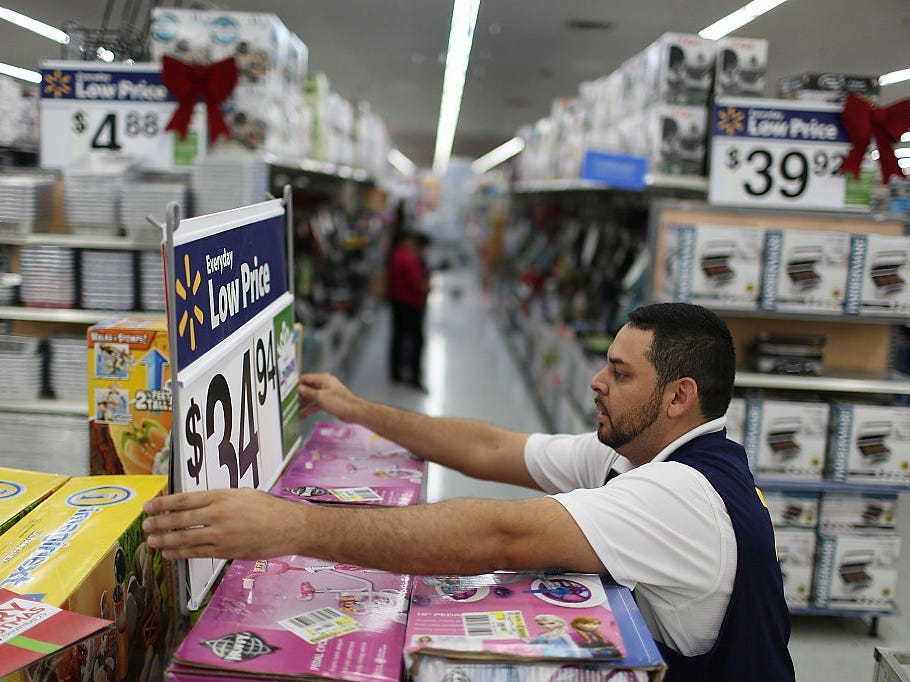- Consumers' wallets are in for a world of hurt in the latter half of 2022.
- That's the takeaway from some of America's top corporate leaders.
- It hints at significant pain ahead for the US economy, as costs continue to rise and consumers feel pinched.
At Walmart, grocery shoppers are cutting back. AT&T customers are paying their bills later than usual. Best Buy has seen a dramatic slowdown in demand for electronics.
While unemployment remains at historic lows, and consumer spending continues to grow, albeit at a slower pace, there are troubling signs for the US economy in second quarter earnings commentary.
In many cases, major corporations are painting a grim picture of the economy's future.
Walmart sounded the alarm on Monday about its consumers no longer being able to afford anything other than basic groceries. "The increasing levels of food and fuel inflation are affecting how customers spend," Walmart CEO Doug McMillon said in a statement.
On Tuesday, Unilever, the parent company of Dove soap and Ben & Jerry's, added to the picture. CEO Alan Jope said on a call with analysts that "peak cost inflation" for the company will not come till later this year, signaling that consumers will continue to be faced with elevated pricing.
"The threat of recession is starting to impact consumer confidence and change spending patterns and behaviors," Jope said
Then, on Wednesday, Best Buy jumped in, flagging a slowdown in customers' interest in electronics.
"As high inflation has continued and consumer sentiment has deteriorated, customer demand within the consumer electronics industry has softened even further, leading to Q2 financial results below the expectations we shared in May," said CEO Corie Barry in the release.
Even companies like McDonald's and Costco — two places consumers can typically count on for low prices — have started to hike prices. Recently, a large number of McDonald's franchisees nixed $1 drinks. The fact that Costco has hiked prices on chicken bakes and sodas is a sign it isn't immune to inflation either.
Some consumers meanwhile are beginning to struggle to pay their phone bills — AT&T said it's seeing an uptick in later payments from customers.
It's not just retailers sounding the alarm. Social-media companies and tech giants have been also impacted by the expectation consumer spending could stall in the months ahead. When businesses cut costs in anticipation of slower growth, advertising spending — a major source of revenue for companies like Snap and Meta — often gets scaled back.
Last week, Snap warned investors that it expects slower growth in the months ahead for this very reason.
"The combination of macroeconomic headwinds, platform policy changes and increased competition have limited the growth of campaign budgets," Snap said in an investor letter.
Similarly, Meta, the parent company of Facebook, highlighted rising inflation and a possible recession on the horizon as challenges for its business.
Headline inflation hit an 8.6% year-over-year pace in July, which is the fastest rate since 1981. And experts say that while inflation may show some signs of having peaked, it's likely that price increases are here to stay for the next few months.
And there's increasing evidence than pandemic savings are beginning to run low for many. Credit card balances have risen $71 billion over the past year and in April, the personal savings rate fell to its lowest level since 2008. Corporate commentary paired with a gloomier picture of Americans' finances hints at a tough second half of the year for businesses and consumers.
One piece of good news: Due to global supply chains finally catching up with the outsized consumer demand seen earlier this year, some department stores like Target are flush with certain products like loungewear, home goods, and electronics. Consumers may find more bargains as stores try to unload bloated inventory, and they may see name brands duking it out with less-expensive store brands to attract their dollars.
But there's a reason these items are getting discounted. Consumers don't want them — having shifted their demand from goods to services. And with inflation impacting everything from food, to gas, to housing, a discount here or there is unlikely to make Americans feel any better about the economy.
